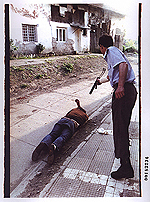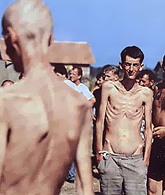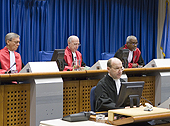The Tribunal irreversibly changed the landscape of international humanitarian law.
The International Criminal Tribunal for the former Yugoslavia (ICTY) is a United Nations court of law dealing with war crimes that took place during the conflicts in the Balkans in the 1990’s. Since its establishment in 1993, it has irreversibly changed the landscape of international humanitarian law and provided victims an opportunity to voice the horrors they witnessed and experienced.
In its precedent-setting decisions on genocide, war crimes and crimes against humanity, the Tribunal has shown that an individual’s senior position can no longer protect them from prosecution.
It has now shown that those suspected of bearing the greatest responsibility for atrocities committed can be called to account, as well as that guilt should be individualised, protecting entire communities from being labelled as “collectively responsible”.
The Tribunal has laid the foundations for what is now the accepted norm for conflict resolution and post-conflict development across the globe, specifically that leaders suspected of mass crimes will face justice. The Tribunal has proved that efficient and transparent international justice is possible.
The Tribunal has contributed to an indisputable historical record, combating denial and helping communities come to terms with their recent history. Crimes across the region can no longer be denied. For example, it has been proven beyond reasonable doubt that the mass murder at Srebrenica was genocide.
Judges have also ruled that rape was used by members of the Bosnian Serb armed forces as an instrument of terror, and the judges in the Kvočka et al. trial established that a “hellish orgy of persecution” occurred in the Omarska, Keraterm and Trnopolje camps of northwestern Bosnia.

While the most significant number of cases heard at the Tribunal have dealt with alleged crimes committed by Serbs and Bosnian Serbs, the Tribunal has investigated and brought charges against persons from every ethnic background. Convictions have been secured against Croats, as well as both Bosnian Muslims and Kosovo Albanians for crimes committed against Serbs and others.
While its judgements demonstrate that all parties in the conflicts committed crimes, the Tribunal regards its fairness and impartiality to be of paramount importance. It takes no side in the conflict and does not attempt to create any artificial balance between different groups. Evidence is the basis upon which the Prosecution presents a case. The Judges ensure a fair and open trial, assessing the evidence to determine the guilt or innocence of the accused.
Established as an ad hoc court, the Security Council endorsed the Tribunal’s completion strategy for a staggered and ordered closure.

Since 2003 the court has worked closely with local judiciaries and courts in the former Yugoslavia, working in partnership as part of a continuing effort to see justice served.
Undoubtedly, the Tribunal’s work has had a major impact on the states of the former Yugoslavia. Simply by removing some of the most senior and notorious criminals and holding them accountable the Tribunal has been able to lift the taint of violence, contribute to ending impunity and help pave the way for reconciliation.
Establishment
In May 1993, the Tribunal was established by the United Nations in response to mass atrocities then taking place in Croatia and Bosnia and Herzegovina. Reports depicting horrendous crimes, in which thousands of civilians were being killed and wounded, tortured and sexually abused in detention camps and hundreds of thousands expelled from their homes, caused outrage across the world and spurred the UN Security Council to act.
The ICTY was the first war crimes court created by the UN and the first international war crimes tribunal since the Nuremberg and Tokyo tribunals. It was established by the Security Council in accordance with Chapter VII of the UN Charter.

The key objective of the ICTY is to try those individuals most responsible for appalling acts such as murder, torture, rape, enslavement, destruction of property and other crimes listed in the Tribunal's Statute. By bringing perpetrators to trial, the ICTY aims to deter future crimes and render justice to thousands of victims and their families, thus contributing to a lasting peace in the former Yugoslavia.
Situated in The Hague, the Netherlands, the ICTY has charged over 160 persons. Those indicted by the ICTY include heads of state, prime ministers, army chiefs-of-staff, interior ministers and many other high- and mid-level political, military and police leaders from various parties to the Yugoslav conflicts. Its indictments address crimes committed from 1991 to 2001 against members of various ethnic groups in Croatia, Bosnia and Herzegovina, Serbia, Kosovo and the Former Yugoslav Republic of Macedonia.
Those interested in the Tribunal's proceedings can visit the ICTY and watch trials first-hand. Trials can also be followed through the internet broadcast on this website.
The ICTY is made up of three main branches: the Chambers, the Registry, and the Office of the Prosecutor.

